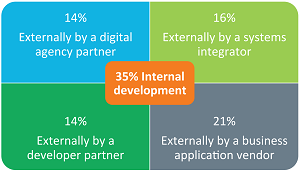News
App Demand Forces Firms to Outside Devs
- By David Ramel
- June 24, 2015
Are we heading back into that whole H-1B visa/outsourcing thing again?
The demand for enterprise mobile apps is too much for in-house developers to handle, forcing companies to look for outside help, according to two new surveys.
Surveys from Gartner Inc. and 451 Research LLC on the state of enterprise mobile app development reached many of the same conclusions, as might be inferred from their respective PR headlines:
- "Gartner Says Demand for Enterprise Mobile Apps Will Outstrip Available Development Capacity Five to One"
- "New Enterprise Mobility Study Reveals IT Struggles to Deliver on Strong Demand for Mobile Apps"
"Organizations want to have full control over their mobile app development initiatives, however, maintaining a pure in-house development environment is difficult to achieve given mobile is a relatively new competency to many developers," Gartner said last week. "It entails many complexities and specific activities, such as UX design and psychology or cellular coverage testing, which may be more efficiently handled by an outsourced third party experienced in mobile app development."
Meanwhile, development tool maker Kony Inc., which commissioned the 451 Research survey, yesterday said, "IT departments are ill-equipped to meet the demand for mobile apps due to budget and resourcing limitations, skills gap, legacy infrastructure, overall technology fragmentation and immature lifecycle workflows. As a result, many companies are looking to external resources to meet business demand for mobile apps."
The notorious skills gap, as usual, is a primary challenge, and it's getting worse as modern mobile apps evolve to new levels of sophistication and complexity to meet enterprise and consumer demands on hardware platforms that are still catching up to desktop brethren. "It is exceedingly difficult and costly to hire developers with good mobile skills," Gartner said.
Kony said it found that 42 percent of mobile app development is currently being done outside of enterprise IT departments, but with exploding demand, it expects in two years that will increase to 65 percent being handed off to business application vendors, system integrators, digital agency partners and developer partners.
 [Click on image for larger view.]
Who's Doing What over Next Two Years (source: Kony Inc.)
[Click on image for larger view.]
Who's Doing What over Next Two Years (source: Kony Inc.)
Gartner said it expects enterprises to beef up their internal mobile dev skills, but only 26 percent are now doing in-house development exclusively, with 55 percent successfully delivering the goods with "mixed sourcing," which it recommends as a partial solution to the problem.
Along with mixed sourcing, Gartner recommends that organizations first prioritize the mobile apps that will provide the best business value. Second, it suggests they adopt a bimodal approach, in which "Mode 1 drives the creation of stable infrastructure and APIs to allow apps to retrieve and deliver data to back-end systems without impacting those enterprise applications, while Mode 2 uses high-productivity, agile approaches to quickly deliver front-end app features required by the business." The research firm also recommends the use of rapid mobile app development (RMAD) tools, which can be used for low-code or no-code approaches.
"There are many approaches to RMAD, including drag-and-drop codeless tools, code generation and orchestration, model-driven development, virtualization, forms construction and others," Gartner said. "These approaches are allowing those with no programming skills or coding ability, such as people in business roles, to rapidly assemble mobile app prototypes and continuously iterate on these designs."
The 451 Research report also sees a role for non-coders, if not by design. "To meet the demands, companies are still heavily reliant on external partners for the bulk of planned development," author Chris Marsh stated. "While an even greater proportion sees professional IT developers doing the majority of internal development, others outside of IT are taking up the slack. Enterprises are consequently falling unplanned into the 'citizen developer' model."
Marsh said that companies using mobile-specific tooling are ahead of the pack. "Companies with the higher numbers of deployed apps are significantly less likely to opt for custom back-end integrations and more likely to be using mobile tools like mobile application platforms and mobile back-end as a service," he said. Kony characterizes itself as a "cloud-based enterprise mobility solutions company and an industry leader among mobile application development platform (MADP) providers."
The for-sale Gartner report, "The Enterprise App Explosion: Scaling One to 100 Mobile Apps," can be purchased
here. The free Kony/451 Research report is available as a
PDF.
About the Author
David Ramel is an editor and writer at Converge 360.